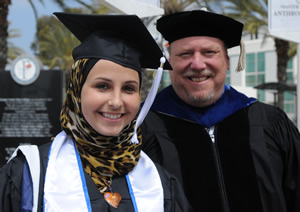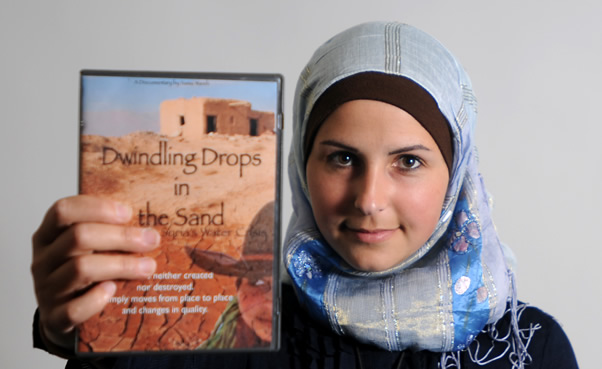What Water?
Graduate Makes Documentary About Environmental Crisis in Syria
June 2, 2009
By Mimi Ko Cruz

Sama Wareh, left, and John Bock at commencement May 24. Photo by Kelly Lacefield
Sama Wareh
Degrees: B.A. radio-tv-film, 2006, M.S. environmental studies, 2009 both at Cal State Fullerton
Residence: Anaheim
Age: 25
Hobbies: Hiking, surfing, filmmaking, painting, drawing, playing music, snowboarding, writing, reading, stand-up comedy, exploring, singing, rescuing animals and traveling
Favorite film: "Amelie"
Favorite quote: "Don't ask what the world needs. Ask what makes you come alive, and go do it because what the world needs is people who have come alive." — Howard Thurman
A couple summers ago on a family visit in Syria, Sama Wareh’s uncle told her: “God help us, we are running out of water.”
His plea became Wareh’s passion, and the Cal State Fullerton environmental studies graduate student spent the next summer documenting Syria’s water shortage.
Last month, Wareh took the stage at her commencement ceremony and explained her award-winning documentary, her master’s project.
“I recalled when my uncle told me that the water was disappearing,” she said. “Not knowing much about water, I decided it would be worth investigating what was happening in Syria. I traveled across the world to investigate a water crisis that parallels our own troubles right here in Orange County, in Fullerton and in our homes. Then again, in all good movies and books, the character usually travels a great distance only to find that the answer was in their own backyard.”
Her documentary, “Dwindling Drops in the Sand,” chronicles Wareh’s journey and explains how global warming, overpopulation and pollution contribute to Syria’s water crisis. It features interviews of environmentalists and officials in Damascus.
The alumna, who earned her undergraduate degree in radio-tv-film in 2006 at Cal State Fullerton, narrates the film. She opens with statistics: “Earth is 25 percent land and 75 percent water. Only 3 percent of that water is fresh water and only 1.5 percent of that fresh water is usable fresh water. Approximately 6.7 billion people share 1.5 percent of the Earth’s water. The distribution of that water however is beginning to shift, as global warming raises temperatures all across the globe, making the dryer places dryer, including Syria.”
She concludes with this message: “In order to accomplish a goal, you first have to recognize the problem. Water is neither created nor destroyed. It only moves from place to place and changes in quality. If we wisely manage how that water moves and flows, we can manage the quality of water and the quality of our lives; for without water, we are nothing.”
Wareh’s documentary will be screened at noon, June 13, in the Titan Student Union’s Titan Theater. The public is welcome to attend the free screening.
The documentary premiered on campus in April and won two awards — Outstanding Documentary and Audience Choice awards — at the university’s Radio-TV-Film Society’s 11th Annual Awards Ceremony.
Wareh is spending the summer teaching at the Environmental Nature Center in Newport Beach, looking into doctoral programs, searchng for a full-time job and submitting her film for presentation at various universities. For more information about “Dwindling Drops,” visit Wareh’s website, www.warehart.com.
“Sama was one of the most dedicated students I have had the good fortune to supervise,” said John Bock, professor of anthropology and coordinator of the environmental studies program. “I’m not alone in this sentiment. At the premiere of her documentary, a professor from her undergraduate days stood and delivered a tribute, saying that anyone who has ever had her in a classroom realizes she is the kind of student who comes along once in a great while. Sama is continuing her work as a naturalist, teaching children about the natural world, while expanding her documentary making and continuing to work on Syria’s water crisis. That is outstanding.”
Wareh, also an artist who paints environmental scenes, recently answered a few questions for Inside:
Q: What is your connection to Syria?
I was born and raised here in the United States, but when I was young, my mother used to take us on summer visits to Syria. The more I went, the more I understood my heritage and culture. I have been infatuated with Syria since I was a little girl. My mom used to use the trip to Syria as bait for good grades.
Q: Why did you decide to go there for your documentary?
Although one motto I like to live life by is “Think Global, Act Local,” this time, it seemed to be reversed: “Think Local, Act Global.” Hearing from my uncle and seeing how much water shutoffs occur in the city of Damascus was an eye-opener. It really hit me when I started learning more and more about the water crisis that California is in and how our government has been dealing with it.
The recycling water program we have here, which is toilet to tap water, is an excellent program in conserving and recycling water. I realized that Damascus needs to parallel Orange County to avoid water shutoffs. I knew that the problem there was a lot bigger than the eye could see, and I had a feeling it would be one of those experiences that took me from knowing nothing and spit me out learning more than I could ever imagine.
Q: What drives your environmental consciousness?
Although I still have a long way to go to be the ideal environmentalist, three main factors drive me.
One: I feel almost a responsibility. It’s overwhelming to think how much nature gives us. The least we can do is give back or try to protect it.
Two: the more I learn about how nature operates, it’s in a human’s best interest to be environmentally conscious. For example, if we overfish the ocean, then we will run out of fish and the food chain in the ocean will just go downhill from there.
Three: I’m a devout Muslim. One of the basic tenants of being Muslim is caring for the environment. It also just so happens to be the one that is most easily forgotten about in Muslim countries. Unless you spend a lot of time in nature, its easy to forget why as humans, we should strive to be environmentally conscious.
Q: How long did it take to complete your film?
In 2007, I acknowledged the problem and, in spring 2008, I declared I would go to Syria to film. I spent three weeks in June there filming ever single day, sometimes all day long. I geographically covered more of Syria in three weeks than I had ever seen in all my summer visits. I began editing in August and finished April 14, a week before my campus premiere.
Q: What are your long-term goals?
My goals include creating environmentally related feature films/documentaries with National Geographic or the Discovery Channel, teaching college-level environmental filmmaking courses and publishing a few books.


